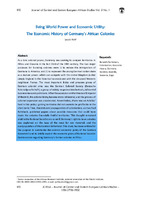Being World Power and Economic Utility: The Economic History of Germany’s African Colonies

Megtekintés/
Metaadat
Teljes megjelenítés
Link a dokumentumra való hivatkozáshoz:
Gyűjtemény
Absztrakt
As a late colonial power, Germany was seeking to conquer territories in Africa and Oceania in the last third of the 19th century. The two major purposes for founding colonies were 1) to reduce the immigration of Germans to America; and 2) to represent the young German nation state as a mature power, which can compete with the United Kingdom (called simply England inthe historical sources) and with the despised Western neighbour France. The most important lobby and pressure group of German colonial aims was the German Colonial Society (Deutsche Kolonialgesellschaft), a group of widely respected intellectuals, influential businessmen and politicians. After the accession on the throne of Emperor Wilhelm II, the colonial lobby became more influential, and the process of colonial expansion was accelerated. Nevertheless, there was an Achilles’ heel in this policy: gaining territories did not seem to be profitable in the short term. Thus, theorists and propagandists of colonization, such as Paul Rohrbach, published papers about possible measures that could have made the colonies financially fruitful territories. This thoughtremained vivid in the National Socialist era as well: Germany’s right to have colonies was explained on the base of the need for raw materials and the overpopulation of the German fatherland. This study has been written for the purpose to summarize the colonial economic policy of the German Kaiserreich and to briefly explain the economic plans of National Socialist German state regarding Germany’s former colonies in Africa.
- Cím és alcím
- Being World Power and Economic Utility: The Economic History of Germany’s African Colonies
- Szerző
- Pálfi, László
- Megjelenés ideje
- 2024-01-03
- Hozzáférés szintje
- Open access
- ISSN, e-ISSN
- 2786-1902
- Nyelv
- en
- Terjedelem
- 170-182 p.
- Tárgyszó
- burundi, Cameroon, colonization, economic history, Germany, Namibia, Rwanda, Tanzania, Togo
- Változat
- Kiadói változat
- A cikket/könyvrészletet tartalmazó dokumentum címe
- Journal of Central and Eastern European African Studies
- A forrás folyóirat éve
- 2024
- A forrás folyóirat évfolyama
- 3. évf.
- A forrás folyóirat száma
- 1 sz.
- Műfaj
- Tudományos cikk
- Tudományterület
- Bölcsészettudományok - történelemtudományok
- Egyetem
- Óbudai Egyetem
- Kar
- Bánki Donát Gépész és Biztonságtechnikai Mérnöki Kar
